Prime Number Post for Friday the 13th: How I write
James Joyce: "The most important thing is not what we write, but how we write..."
(photo credit: Google search)
(photo credit: AZ Quotes)
(photo credit: Google Search)
(photo credit: Google Search)
How I Write (For those who read others in the series skip to #7; that’s the newest entry)
Alrightie then! Ready for a recap?
1. I write to discover: the truth and the ending in both my stories and in my life.
2. I write at the dining room (when possible) because I need a lot of open space and natural lighting.
3. How I write? From my interests, emulation, personality, experience, and challenges. I cannot get away from using the five writing steps and the six writing traits. I don’t believe in there being an either/or for pantsing and plotting. I don’t believe it is “and/both” either. I believe in REVISING. I spend most of my time revising, folks. I am a REVISER. Jeff the Reviser. That’s me.
(Reviser, I am ! link) https://jeffreycummins.substack.com/p/pantster-or-plotter-says-you-reviser?r=4r6kwu
(How I write link) https://jeffreycummins.substack.com/p/how-we-write?r=4r6kwu
4. What do I write? A few different kinds of genres: fantasy (especially portal fantasies), contemporary post-modern, and ghost tales of the “shudder” variety. The “why” I write these versus, say, romance or cookbooks or romantic cookbooks or how to cook up some romance stems from interests, emulation, personality, experience, and challenges. This entailed me listing my earliest influences: movies along these kinds of genres with the strongest being Star Wars from 1977 when I was seven years old. I gave a few of my earliest reading influences as well: the Bible, Stephen R. Donaldson, Stephen King, and Edgar Allan Poe. Also, I mentioned how listening to hard rock and progressive rock and being in alternative bands influenced my writing (that’s putting mildly: rock lyrics have had a profund impact on me since I emulated Neil Peart above so many others and have written scads of lyrics: some recorded and some not)
(link) https://jeffreycummins.substack.com/p/prime-number-post-3rd-day-dab?r=4r6kwu
5. An important aspect to “How I Write” is RESEARCH. That post has grown out of a reply I posted to a note by @Janine Eaby. She mentioned the fact that if a writer presents within the context of the plot that there was a full moon in one scene then the writer better not mentioned there came a crescent or even new moon just a few days later. That means CONTINUITY and knowing actual science and biology and psychology versus just suspending disbelief and “making it all up.” You can read that post here:
6. To better understand “What I Write” and “How I Write”, I gave my “INFLUENCES” in two posts:
What influenced me to become a lifelong reader:
What authors had the most profound effect upon me as a young reader and still to this day (heroes, baby, we all got heroes)
7. The meat of this post will be:
How I write:
I…
am guilty of purple prose.
love thematic passages.
and poetic tone images.
admire pure story novels: Treasure Island , The Running Man, Lord Kalvan of Otherwhen, The Hobbit, the simple mythos of Star Wars; the story cycle of Le Morte De Arthur; the Story Arc of the Odyssey
But I don’t write like that, folks.
Or I can’t, though I might try.
When I do try, my attempts at pure story seem bland and thin or weak.
And what is funnier is that I use to hate novels that made you “think” or played literary games. Until I realized that the author is in full control: character, plot, theme, tone, and style. This is what revising is for.
All my stories start with an image or a scene that can usually be placed near the climax. Along with that comes a title. A title is the first tie to the theme. What is that about? Why is this image happening?
The more I write, especially in particular genres, the more I want to take chances. Writing the same story over again and again or, worse, simply re-writing a story out of imitation is just boring to me.
I’d rather be inspired and make mistakes and fail in my narratives and annoy my critics than play it safe and numb their brains and never penetrate their heart.
When I began to take fiction writing seriously at age thirty-five and wanted to write with the idea of getting good at my craft and publishing, I began to take note of advice from some of my favorite authors who were famous, had millions of copies of their works sold, and had won several awards (maybe their advice would be worth heeding?). This is what I learned from Stephen R. Donaldson: “writing can’t be taught, but it can be learned.”
That means you learn by doing and by studying examples. Compare and contrast. Write out your ideas and work through your failures. You also learn by reading lots of other writers (which is an ingredient Stephen King is adamant about: a writer must not only write a lot, but read a lot, too.). Also, from King comes this advice: have a quota. His is over 3,000 words a day or at least 3,000. W.P. Kinsella had his at about 2,500 or so. But he said once you’re done, stop. It might take you three or four or five hours since each day is different, but he couldn’t tell the three hours’ day writing from the five hours’ day writing. Point taken: having a quota will help you with consistency and productivity.
The quota should be malleable depending upon the amount of time you can set aside. Also, when you doing edits or revising, do it by pages and don’t worry about a word count. For instance, it might take you an hour to do five pages or more. But the revising and editing, she must be done!
Also, I cannot begin to admit the effect that poetry, especially song lyrics, have had on me. Just like Poe or Faulkner who both started out with the grand aim of becoming famous poets first and foremost, I wanted to become a poet or rather, write rock songs. Besides Poe, I loved the lyrics of Neil Peart, the works of Blue Oyster Cult, Bob Dylan, Pete Townshend, Paul Simon, Fish, Sting (when he was in the Police), and Lou Reed. Rock and progressive rock have had a profound effect upon me (and it makes up my playlists on Spotify for the background as I write).
I also recommend writing to prompts or answering story challenges and sentence modeling or trying your hand at certain poetic structures (say like a haiku or a sonnet—Italian over an Elizabethan).
I prefer third person limited, very limited. Really, my characters don’t have much “science” (who does besides God?), but they think do (some think they are better than God). Some can be know-it-alls and get argumentative, which can make my stories didactic or might cause you to think. But when George Bernard Shaw was accused of making his art didactic he shot back that he was out to prove that art should be didactic. Point being: your characters have to believe in something and their speech better be honest with their world views and belief systems. Don’t waffle on being honest with your characters.
I have also come to love word games (my first published work, the Young Adult Christian fantasy is titled Leftwich Blues/Elfwitch Rules, yet it is an anagram), discursive works with allusions to music bands or other tales, and arguments. I love crafting a story around a theme, or an experience that leads to working out an argument. I haven’t done allegory, but it is appealing.
So, I’ve got that going for me, which is nice.

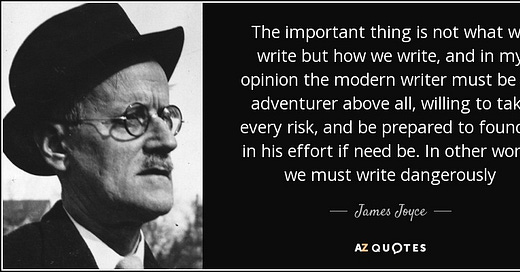


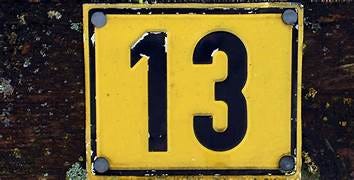

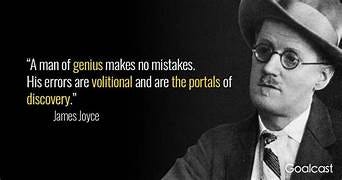
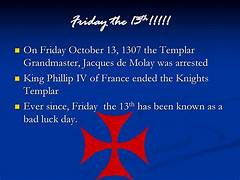

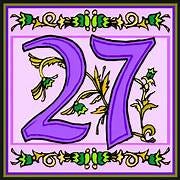

@Janine Eaby, thank you for the like!
Edna O’Brien estimated it took James Joyce 22,000 hours to write Ulysses. https://gallagherpdx.substack.com/p/how-a-single-judge-allowed-ulysses